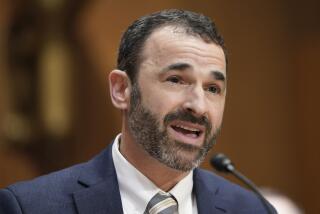IRS Says Firms, Execs Used Ploy to Avoid Taxes
- Share via
At least 42 major public corporations helped their top executives duck income taxes on $700 million in stock-based compensation, often to the detriment of shareholders, the Internal Revenue Service said Tuesday.
The companies involved are “household names,” IRS Commissioner Mark W. Everson said at a news conference in Washington. Taxpayer privacy laws, however, bar the IRS from releasing the names of companies and executives suspected of using the tax dodge, he said.
Under the scheme, an executive paid in stock or options would transfer those shares into a family limited partnership, the IRS said. In exchange, the executive would get a long-term IOU from the family partnership.
The executive wouldn’t pay tax on the stock-based income until the IOU came due, often 15 to 30 years after the executive had received the stock. In the meantime, the partnership -- controlled by the executive and his or her family -- could sell the stock at a profit and have the use of the untaxed proceeds for decades.
The IRS first became aware of the problem in 2003, Everson said, and subsequent audits have identified about 200 executives who used the ploy.
Everson said anyone found guilty in Tax Court of using the scheme could be forced to pay the tax owed and a 20% penalty, plus accrued interest.
To encourage compliance, the IRS commissioner said people who admitted their use of the ruse by May 23 would be able to get right with the IRS by paying a 10% penalty, plus back taxes and interest.
Everson said one of the most disturbing elements of the scheme was that companies were, in almost every case, told about it by the accounting firms conducting their audits.
The scheme often cost shareholders because at least half of the companies didn’t take tax write-offs for the stock-based compensation -- making the compensation far more expensive to the company.
“These transactions raise questions not only about compliance with the tax laws but also, in some instances, about corporate governance and auditor independence,” Everson said. “These deals were done for the personal benefit of executives, often at the expense of shareholders.”
Everson said the privacy laws prohibited the IRS not only from making the names of the corporate taxpayers public but also from sharing their names with the Securities and Exchange Commission, which regulates publicly traded companies.
The Senate Finance Committee, which helps write the nation’s tax laws, is considering whether the privacy laws need to be changed to give regulators access to information that might be related to financial reporting shenanigans, a senior aide to the committee said Tuesday.
“It is an issue that has been raised to us, and the commissioner is making a good case for saying this is something we should consider,” said the aide, who declined to be identified.
More to Read
Inside the business of entertainment
The Wide Shot brings you news, analysis and insights on everything from streaming wars to production — and what it all means for the future.
You may occasionally receive promotional content from the Los Angeles Times.










